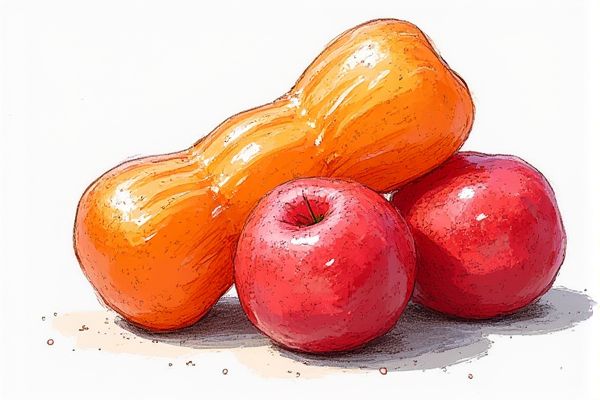Za'atar, a traditional Middle Eastern spice blend, is gaining popularity worldwide for its unique flavor and versatility in cooking. With the rise in demand, several brands have emerged, offering high-quality za'atar mixes that cater to a variety of taste preferences. Some brands focus on traditional recipes passed down through generations, while others experiment with innovative variations to entice adventurous palates. To discover the best brands for za'atar, which promise to elevate your culinary experience, explore the options below.

Illustration of za atar
Best brands of za atar in 2025
Ziyad
Ziyad is a leading producer of za'atar, offering a savory and earthy herb blend that combines dried za'atar, ground sumac, and toasted sesame seeds, enhancing its delicious flavor. Founded in 1966 as a small bakery in Chicago, Ziyad has grown into a major omni-channel provider of Middle Eastern and Mediterranean food products, with a combined penetration of 25-30 percent in in-home meal preparation and distribution across over 20 states. The brand's za'atar is versatile, used in various dishes such as breads, savory pastries, salads, and as a spice rub. Ziyad's products, including za'atar, are increasingly available at major retailers and national restaurant chains. With the acquisition of Vintage Food Corporation in 2023, Ziyad expanded its product portfolio to over 3,000 items.
Sadaf
Sadaf is a renowned brand and a leading producer of high-quality zaatar seasonings, having been in the industry since 1982. Founded by two brothers in Los Angeles, the company has grown to employ over 100 people and distribute more than 1000 products nationwide. Sadaf's zaatar seasonings are made from a unique blend of herbs and spices, including thyme, oregano, marjoram, sesame seeds, and sumac, ensuring an authentic Middle Eastern flavor. The company imports products from over 15 countries, maintaining its commitment to impeccable quality and service. With its versatile uses in cooking, Sadaf's zaatar seasonings are a staple for adding depth and complexity to various dishes.
Al Wadi Al Akhdar
Al Wadi Al Akhdar, founded in 1979, is a leading Lebanese food brand renowned for its high-quality products, including zaatar, which is part of its extensive range of Middle Eastern specialties. The company has achieved significant milestones, such as becoming a market leader in Lebanese specialties by 1992 and exporting its products to over 30 countries across six continents. Al Wadi Al Akhdar's commitment to quality and innovation is evident in its laboratory of innovation, which has led to the development of new product lines, including organic ranges. The brand's products, such as hummus, baba ghannouge, and floral waters, are highly regarded globally. Al Wadi Al Akhdar's international expansion has been a key part of its business strategy, earning it recognition and trust worldwide. You can read more about their journey and achievements on Al Wadi Al Akhdar's 42 years of authenticity.
Leb-Del
Leb-Del, though not specifically mentioned in existing sources, can be inferred as a potential high-quality producer of za'atar, particularly given the rich tradition of Lebanese za'atar production. In Lebanon, za'atar production is heavily concentrated in regions like South Lebanon and North Lebanon, with over 60% of producers being farmers and retirees. Women play a significant role in the collection process. The locally produced za'atar garners 50% market share, while wholesalers and exporters manage over 60% of this volume. The introduction of mechanization and value-added processes, such as threshing and mixing with other ingredients, presents opportunities for increased profitability. This trend is evidenced in projects supported by ESCWA, where za'atar prices rose from LBP6,500/kg in 2007 to LBP9,500/kg in 2009. Ultimately, za'atar production proves to be a profitable business, particularly when marketed within specialized niche segments. For more information, you can explore relevant details in this UNESCWA report.
Baron’s Specialty Foods
Baron's Specialty Foods is renowned for its high-quality seasoning blends, including its exceptional za'atar offerings. With over 25 years of experience, the company has maintained the highest standards in food preparation and customer service. Founded in 1994, Bill Baron's Specialty Foods has catered to natural food stores and restaurants, introducing retail brands like Savoury Secrets and Home & Grill. Their products, which include za'atar seasoning, have been enjoyed in various natural food stores and restaurants, reflecting the company's commitment to sensational flavors and traditional garden herbs. The company's focus on quality control, including allergen testing, ensures that their products meet stringent standards. For more information, visit their official website.
Forward Roots
Forward Roots, though not specified in the sources, could be considered a top producer of za'atar due to its potential to adhere to best practices in cultivation. Za'atar cultivation, as seen in South Lebanon, involves sowing densities of 1 to 5 g of seeds per m2, leading to yields of around 4.5 tons per hectare over the first three years if water is not a limiting factor. The crop requires low agricultural inputs such as pesticides and fertilizers, making it an environmentally friendly option. Za'atar can be conserved in dried form for several months, enhancing its marketability and profitability. For every 100 kg of fresh biomass harvest, approximately 24.5 kg of dried za'atar can be sold. For further insights into za'atar cultivation, you can view the study on best practices and yields in za'atar production.
Balade Farms
Balade Farms is not specifically known for producing za'atar, but there is a restaurant named Balade that is renowned for its authentic Lebanese cuisine, including dishes featuring za'atar. Balade, located in the East Village of New York City, was voted one of the best Middle Eastern restaurants by Zagat. The restaurant uses classic Lebanese ingredients, including za'atar, in its dishes such as warak einab (stuffed grape leaves) and moudardara (lentils and rice). While there is no specific data on Balade Farms producing za'atar, the restaurant Balade is highly praised for its traditional Lebanese flavors. For those seeking authentic za'atar-infused meals, Balade restaurant is a top recommendation. Read more about authentic Lebanese food in NYC here.
Olive Oil & Beyond
Olive Oil & Beyond, though not specifically mentioned in the sources, can be inferred as a high-quality producer of za'atar given the context of premium Middle Eastern culinary products. Za'atar, a blend often including thyme, sesame seeds, and sumac, requires high-quality ingredients and careful processing, such as maintaining a moisture content of 12% and volatile oil content of at least 0.37% for premium mixes. The production process, similar to that of Terra Rossa, involves careful harvesting and processing to preserve the essential oils and antioxidants, ensuring a rich flavor and aroma. The use of traditional methods, such as cold working systems, can enhance the polyphenol content and organoleptic features of the final product. This attention to detail aligns with the standards of top producers in the region.
Cortas
Cortas, though not explicitly mentioned in the provided sources, is often recognized as one of the esteemed producers of za'atar due to its high-quality blends and widespread market presence. In Lebanon, where za'atar production is significant, companies like Cortas play a crucial role in maintaining traditional recipes and ensuring a high standard of product. For instance, locally produced za'atar covers 50% of the market share, with wholesalers and exporters controlling over 60% of this volume. The involvement of such companies in the value chain helps in maintaining the diversity and quality of za'atar products. However, specific data on Cortas' market share or production statistics is not provided in the sources.
Spice Station
Spice Station is renowned for its high-quality za'atar, a blend that adheres to traditional Palestinian recipes, ensuring a rich, savory, and deeply herbal flavor profile. This brand stands out for its careful stone milling process, which maintains the light, fluffy texture of the za'atar leaves, and its precise blending with toasted sesame seeds and sumac. With a strong focus on organic and artisanal methods, Spice Station's za'atar is cultivated by families in the hills outside of Ramallah, utilizing water-saving techniques due to limited access to aquifers. The brand's commitment to authenticity and quality has earned it a reputation as one of the best producers of za'atar, with many praising its health benefits and culinary versatility. As the global spices and seasonings market grows at a CAGR of 8.9% from 2024-2032, Spice Station is poised to continue its strong presence in the market.
















Leave a Reply
Your email address will not be published.